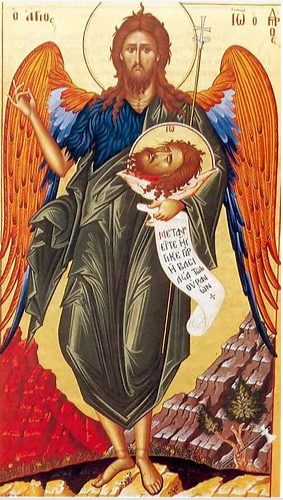
Dear Brothers and Sisters in Christ,
Today, August 29th marks one of the most sad and unjust days in the life of the Church. Perhaps their is no other account of martyrdom as senseless as that of the Baptizer. His life was stricken from this earth, not from the impetuousness of religious zeal, or from one’s theological dispute, but rather from the even darker places of human anger, spite, vengeance, revenge and blood-thirsty power. Please keep today in quiet contemplation and prayerful attention. Please also take the time to read the following account of today’s commemoration from the Orthodox Church in America.
The Beheading of the Prophet, Forerunner of the Lord, John the Baptist: The Evangelists Matthew (Mt.14:1-12) and Mark (Mark 6:14-29) provide accounts about the martyric end of John the Baptist in the year 32 after the Birth of Christ.
Following the Baptism of the Lord, Saint John the Baptist was locked up in prison by Herod Antipas, the Tetrarch (ruler of one fourth of the Holy Land) and governor of Galilee. (After the death of king Herod the Great, the Romans divided the territory of Palestine into four parts, and put a governor in charge of each part. Herod Antipas received Galilee from the emperor Augustus).
The prophet of God John openly denounced Herod for having left his lawful wife, the daughter of the Arabian king Aretas, and then instead cohabiting with Herodias, the wife of his brother Philip (Luke 3:19-20). On his birthday, Herod made a feast for dignitaries, the elders and a thousand chief citizens. Salome, the daughter of Herod, danced before the guests and charmed Herod. In gratitude to the girl, he swore to give her whatever she would ask, up to half his kingdom.
The vile girl on the advice of her wicked mother Herodias asked that she be given the head of John the Baptist on a platter. Herod became apprehensive, for he feared the wrath of God for the murder of a prophet, whom earlier he had heeded. He also feared the people, who loved the holy Forerunner. But because of the guests and his careless oath, he gave orders to cut off the head of Saint John and to give it to Salome.
According to Tradition, the mouth of the dead preacher of repentance once more opened and proclaimed: “Herod, you should not have the wife of your brother Philip.” Salome took the platter with the head of Saint John and gave it to her mother. The frenzied Herodias repeatedly stabbed the tongue of the prophet with a needle and buried his holy head in a unclean place. But the pious Joanna, wife of Herod’s steward Chuza, buried the head of John the Baptist in an earthen vessel on the Mount of Olives, where Herod had a parcel of land. (The Uncovering of the Venerable Head is celebrated February 24). The holy body of John the Baptist was taken that night by his disciples and buried at Sebastia, there where the wicked deed had been done.
After the murder of Saint John the Baptist, Herod continued to govern for a certain time. Pontius Pilate, governor of Judea, later sent Jesus Christ to him, Whom he mocked (Luke 23:7-12).
The judgment of God came upon Herod, Herodias and Salome, even during their earthly life. Salome, crossing the River Sikoris in winter, fell through the ice. The ice gave way in such a way that her body was in the water, but her head was trapped above the ice. It was similar to how she once had danced with her feet upon the ground, but now she flailed helplessly in the icy water. Thus she was trapped until that time when the sharp ice cut through her neck.
Her corpse was not found, but they brought the head to Herod and Herodias, as once they had brought them the head of Saint John the Baptist. The Arab king Aretas, in revenge for the disrespect shown his daughter, made war against Herod. The defeated Herod suffered the wrath of the Roman emperor Caius Caligua (37-41) and was exiled with Herodias first to Gaul, and then to Spain.
The Beheading of Saint John the Baptist, a Feast day established by the Church, is also a strict fast day because of the grief of Christians at the violent death of the saint. In some Orthodox cultures pious people will not eat food from a flat plate, use a knife, or eat food that is round in shape on this day.
With Love in XC,
Fr. Anthony
Please remember the Giving Grid and participate! Please pay attention to the continued/altered Liturgical Schedule as influenced by the realities of an on-going pandemic and health crisis. Please be patient, prayerful and understanding.